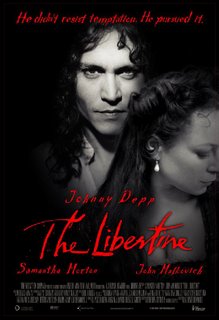
The Black Dahlia
2006 dir. Brian De Palma
This isn't just the worst movie of the year so far...this may be the worst movie Brian De Palma has ever made, and that's saying something. That's counting "Snake Eyes," "Raising Cain" AND "Mission to Mars."
Generally, you give four stars for a movie: one for acting, one for cinematography, one for writing and one for editing and overall presentation.
This is a one star film. Some of the cinematography is great. Most is okay. Some is laughably bad. The acting goes from passable to terrible. Where the writing isn't painfully languid, it's muddled. As for storytelling, well, the film kind of meanders around for an hour and a half with no sense of anything being at stake and then kicks into high gear for a shrug-inducing third act wrapup of multiple plot elements, some of which were not even INTRODUCED during the dilauded-inspired first two acts.
The only stand-out performance is Fiona Shaw as the drunken society matron. Her high-camp drag-queen performance pulls the film awkwardly, but with some refreshing humor, into "Mommie Dearest" territory.
Oh, and note to Brian de Palma: first person cameras were edgy and experimental in the 70s but today they just make the audience think they're playing Doom. When the main character's evidence collection at the site of the murder is shot this way, I'm thinking "switch to your shotgun and shoot into the closet...there's a bile demon in there!"
And note to Ellroy: if you anticipate that your book is going to be made into a movie, try to pick character names a little more distincitve from each other than "Bleichert" and "Blanchard." It's hard enough to care about these people without their names sounding exactly the same. That's like naming all your characters 'Roy' for no reason...friends often have the same name, but it's not always the best literary choice.
See, here you have a movie about one of the most sensational murders in modern American history. A killing which, at the time and even now, has inpired conspiracy theories and public dread. Elizabeth Short is the ultimate Hollywood enigma: failed actress, invisible even to those around her until she is brutally murdered, at which point she is burned into Hollywood history forever. She is the lacerated metaphor for how LA (especially Ellroy's LA) will fucking eat you, fucking alive and that's what we all love about it.
But the movie captures almost none of this. We see very little public interest or even reaction to the killing. We see very little of the political mechanations of the investigation. LA Confidential struck a great balance between real gumshoe police work and law enforcement image-management...and it was at its brilliant BEST when it showed that these two things are not mutually exclusive.
But in The Black Dahlia, we barely get sense that Elizabeth Short's murder mattered to anyone except a handful of primary characters.
And, like the book, the movie leaves itself painted into a corner: you must have cops solve the case to pay off the story, but the case was never solved so the cops must find the truth and choose to bury it.
This problem has been solved time and again in films, usually with a nice piece of "conflict of duties" melodrama. I won't spoil it, but let's just say that if this is what you're hoping for, you should manage your expectations a little.
One star. Jason sez this one isn't even worth a punchline.

